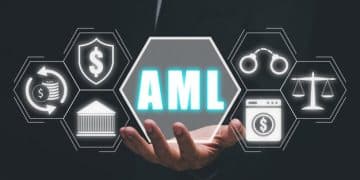US Startup Sustainability Initiatives: Eco-Friendly Practices & Investor Appeal

US Startup Sustainability Initiatives: How Are Startups Implementing Eco-Friendly Practices to Attract Investors? In the dynamic US startup landscape, eco-friendly practices are becoming crucial not just for environmental stewardship but as a strategic imperative to attract discerning investors.
The landscape of modern business is rapidly evolving, with a profound shift towards greater environmental consciousness. Within this transformation, US startup sustainability initiatives: how are startups implementing eco-friendly practices to attract investors? emerges as a pivotal question. Beyond mere compliance or public relations, integrating sustainable practices has become a core strategic move for nascent companies looking to differentiate themselves and secure crucial funding in a competitive market.
The Greening of Startup Culture: A Fundamental Shift
The startup ecosystem in the United States is witnessing a profound transformation, moving beyond traditional growth metrics to prioritize sustainable development. This isn’t merely a trend; it represents a fundamental recalibration of what constitutes success in the modern economy. Startups, with their inherent agility and capacity for innovation, are uniquely positioned to lead this charge, embedding eco-friendly practices into their DNA from inception.
Redefining Value Beyond Profit
Historically, the primary focus of startups and their investors has been rapid user acquisition, market share capture, and ultimately, profitability. While these remain critical, there’s a growing recognition that value must extend beyond the purely financial. Environmental, Social, and Governance (ESG) factors are increasingly shaping investment decisions, pushing startups to consider their broader impact. This shift implies a move from a linear “take-make-dispose” model to more regenerative and circular approaches.
* **Integrated Business Models:** Sustainability is no longer an add-on but an intrinsic part of the business model. This means designing products for longevity, using sustainable materials, and minimizing waste throughout the supply chain.
* **Stakeholder Capitalism:** Beyond just shareholders, startups are now accountable to a wider array of stakeholders, including employees, customers, communities, and the environment. This broader accountability drives more responsible business practices.
* **Long-Term Resilience:** Companies that embrace sustainability are often more resilient to future shocks, whether they are regulatory changes, resource scarcity, or shifts in consumer preferences. This foresight appeals to long-term investors.
This ethos permeates every decision, from sourcing raw materials to product design and end-of-life considerations. Early integration means these practices are not retrofitted, but are foundational, often leading to more efficient and innovative solutions from the outset. Many young companies are building their entire value proposition around solving environmental problems, thereby creating a double bottom line that appeals to a new generation of impact investors.
Eco-Friendly Practices: Beyond the Obvious
While “eco-friendly” might immediately evoke images of recycling bins and solar panels, the reality within startups is far more nuanced and integrated. Sustainable practices are being woven into the very fabric of operations, often leveraging technology and innovative thinking to create systemic change. Investors are keenly observing these deeper commitments, seeking tangible evidence of environmental stewardship.
Supply Chain Transparency and Ethical Sourcing
One of the most impactful areas for startups is their supply chain. Gone are the days when companies could afford to be ignorant of their suppliers’ practices. Modern sustainability demands meticulous scrutiny.
* **Mapping the Supply Chain:** Startups are increasingly investing in software and methodologies to fully map out their supply chains, identifying potential environmental and social risks from raw material extraction to final delivery.
* **Certifications and Standards:** Prioritizing suppliers with certifications like Fair Trade, LEED (for facilities), or B Corp status demonstrates a commitment to ethical and sustainable sourcing. This due diligence reduces reputational risk and assures investors of responsible operations.
* **Local Sourcing:** Reducing transportation emissions and supporting local economies are dual benefits of localized supply chains. Many food, beverage, and consumer goods startups are championing this approach.
This commitment extends to adopting circular economy principles. Instead of a linear production model, startups are exploring ways to design products for disassembly, reuse, and recycling. Companies are finding innovative ways to turn waste into valuable resources, minimizing landfill contributions. This closed-loop thinking not only benefits the environment but can also lead to significant cost savings and new revenue streams, a definite draw for investors.
Energy Efficiency and Renewable Energy Adoption
Reducing energy consumption and shifting towards renewable sources are foundational pillars of eco-friendly operations. Startups, often unburdened by legacy infrastructure, can adopt these practices more readily.
* **Green Office Spaces:** Many startups opt for office spaces designed with energy efficiency in mind, incorporating natural light, smart HVAC systems, and water-saving fixtures. Some even choose co-working spaces that adhere to high sustainability standards.
* **Renewable Energy Procurement:** For energy-intensive operations, purchasing renewable energy credits (RECs) or directly investing in onsite solar panels or wind turbines demonstrates a clear commitment to decarbonization. Software companies, for instance, can choose data centers powered by renewables.
* Operational Optimization: Beyond physical infrastructure, digital companies optimize their code and server usage to reduce computational energy demands. This level of granular attention to energy consumption showcases true dedication.
These measures contribute directly to reducing a startup’s carbon footprint. Investors see in this not just environmental responsibility but also sound financial management, as energy costs can be volatile, and reliance on fossil fuels carries future regulatory and pricing risks. A strong stance on renewable energy signifies a robust and forward-thinking business strategy.
The Investor Lens: Why Sustainability Matters for Funding
For startups, securing investment is paramount, and increasingly, demonstrating a credible commitment to sustainability is becoming a non-negotiable aspect of that process. Investors are not just looking for financial returns; they are seeking businesses that are future-proof, resilient, and align with a broader societal shift towards responsible capitalism. This is where the intersection of eco-friendly practices and investor attraction becomes critical.
Mitigating Risks and Ensuring Long-Term Value
Sustainable practices are not merely about “doing good”; they are about smart business and risk management. Investors recognize that companies with strong ESG credentials are often better positioned to navigate future challenges.
* **Regulatory Compliance:** As environmental regulations become stricter, startups already adhering to high standards are less likely to face fines, operational disruptions, or costly overhauls. This foresight limits future liabilities.
* **Resource Scarcity and Cost Volatility:** Businesses dependent on finite resources face increasing costs and supply chain instability. Sustainable practices, such as circular economy models or efficiency improvements, mitigate these risks, ensuring operational continuity.
* **Reputational Risk:** Negative publicity stemming from environmental negligence can severely damage a startup’s brand, alienate customers, and deter top talent. Investors are wary of such risks, preferring companies with strong ethical standing.
By proactively addressing these potential pitfalls, startups offer investors a more secure and stable investment proposition. Building a business model that integrates environmental consciousness from the ground up often means building a more resilient business overall, less susceptible to external shocks.
Access to a New Investor Pool: Impact and ESG Funds
The rise of impact investing and ESG-focused funds has created a new, substantial pool of capital specifically seeking out sustainable ventures. These investors are driven by a dual mandate: generating financial returns alongside positive social and environmental impact.
* **Specialized Funds:** Venture capital firms and private equity funds are increasingly launching dedicated ESG or impact funds, making sustainability a primary criterion for their investment decisions.
* **Institutional Investors:** Pension funds, endowments, and other large institutional investors are under growing pressure to integrate ESG factors into their portfolios. They are looking for startups that can demonstrate quantifiable positive impacts.
* **Angel Investors and HNWIs:** A growing segment of high-net-worth individuals and angel investors are personally committed to sustainability and are keen to deploy their capital into businesses that align with their values.
Attracting these investors means speaking their language, providing robust data on environmental performance, and demonstrating a clear path to achieving sustainable goals. A startup with a compelling sustainability narrative, backed by verifiable actions, can stand out in a crowded market and tap into this expanding capital base, often at more favorable terms due to reduced perceived risk.
Showcasing Sustainability: Metrics and Reporting
Having robust eco-friendly practices is one thing; effectively communicating them to potential investors is another. Transparency, verifiable data, and clear reporting are crucial for startups aiming to attract funding based on their sustainability credentials. Investors need to see tangible proof, not just promises.
Developing Measurable KPIs for ESG Performance
Just as financial performance is measured with KPIs like revenue growth and profit margins, environmental performance requires equally rigorous metrics. Startups need to identify, track, and report on key sustainability indicators.
* **Carbon Footprint:** Tracking Scope 1, 2, and increasingly Scope 3 emissions provides a comprehensive view of a startup’s climate impact. Setting reduction targets and regularly reporting progress is vital.
* **Resource Consumption:** Measuring water usage, energy consumption (electricity, gas), and raw material inputs offers insights into efficiency and waste reduction efforts.
* **Waste Diversion Rates:** Quantifying the amount of waste diverted from landfills through recycling, composting, or reuse programs demonstrates circular economy principles in action.
* **Supply Chain Sustainability Metrics:** Tracking supplier compliance with environmental standards, ethical labor practices, and sustainable sourcing policies adds another layer of credibility.
These metrics go beyond anecdotes, providing investors with concrete data points to evaluate a startup’s environmental commitment and progress. Tools and platforms are emerging to help startups collect and visualize this data effectively, even for early-stage companies.
Leveraging Certifications and Frameworks
Adopting internationally recognized certifications and reporting frameworks adds a layer of third-party validation to a startup’s sustainability claims, building trust with investors.
* **B Corp Certification:** This rigorous certification assesses a company’s entire social and environmental performance, accountability, and transparency. It’s a powerful signal to investors who prioritize purpose-driven businesses.
* **Global Reporting Initiative (GRI) Standards:** While comprehensive, GRI standards provide a framework for reporting on a wide range of sustainability impacts, making a startup’s efforts comparable and credible.
* **Science-Based Targets initiative (SBTi):** Committing to SBTi means setting emissions reduction targets in line with climate science to limit global warming. This demonstrates a serious commitment to climate action.
These frameworks and certifications validate a startup’s commitment, simplifying the due diligence process for investors and signaling a mature approach to sustainability. They provide a common language and a benchmark against which performance can be assessed, offering a trusted basis for investment decisions.
Challenges and Opportunities in Sustainable Startup Growth
While the benefits of integrating sustainability are clear, US startups face unique challenges in adopting and scaling eco-friendly practices. These challenges, however, often present novel opportunities for innovation, setting sustainable startups apart from more traditional counterparts. Navigating these complexities effectively is key to attracting and retaining investor interest.
Overcoming Initial Cost Barriers
Implementing sustainable practices can sometimes involve higher upfront costs, whether it’s investing in new green technologies, sourcing more expensive ethical materials, or revamping supply chains. This can be a hurdle for cash-strapped startups.
* **Strategic Investment:** Smart startups frame these costs not as expenses, but as strategic investments that lead to long-term savings (e.g., reduced energy bills), market differentiation, and access to new investor pools.
* **Green Subsidies and Incentives:** Governments and local municipalities often offer tax credits, grants, or other incentives for businesses adopting green technologies or sustainable practices. Actively seeking these out can offset initial costs.
* **Innovative Financing Models:** The rise of green bonds, sustainability-linked loans, and impact investment funds provides alternative financing avenues specifically designed to support sustainable ventures, often with favorable terms.
Early investment in sustainability often yields dividends in enhanced brand reputation, customer loyalty, and improved operational efficiency. Investors are increasingly willing to fund these initial outlays, recognizing the compounding value over time.
Scaling Sustainably: Maintaining Integrity Amidst Growth
As startups grow rapidly, a significant challenge lies in ensuring that sustainability scales alongside the business. What works for a small team might falter under the pressures of mass production or global expansion.
* **Embedding Sustainability into Culture:** From day one, sustainability must be a core value, not just a department. Employees at all levels need to understand and champion the company’s environmental mission.
* **Technology for Transparency:** Utilizing blockchain for supply chain traceability, AI for energy optimization, and data analytics for impact measurement can help maintain transparency and accountability even across complex, growing operations.
* **Partnerships and Collaboration:** Collaborating with established sustainable suppliers, logistics providers, or even competitors can help mitigate the environmental impact of rapid scaling and share best practices.
Investors are wary of “greenwashing” – companies that make unsubstantiated sustainability claims. Therefore, demonstrating a clear roadmap for how eco-friendly practices will evolve with growth, backed by continuous monitoring and reporting, is crucial for maintaining investor confidence. This commitment to scaling responsibly reassures investors of long-term vision and integrity.
The Future Landscape: Predictions and Outlook
The trajectory for US startups implementing eco-friendly practices to attract investors points towards an accelerating trend rather than a fleeting moment. As environmental concerns deepen and regulatory frameworks evolve, sustainability will transition from a competitive advantage to a fundamental expectation for any viable business. The landscape of 2025 and beyond will be defined by deeper integration, greater transparency, and an even stronger link between ecological performance and financial success.
Increased Scrutiny and Standardization
The current enthusiasm for sustainability will inevitably be followed by increased scrutiny. Investors, consumers, and regulators will demand more than superficial claims.
* **Robust Reporting Mandates:** Expect more stringent and standardized ESG reporting requirements, potentially moving beyond voluntary frameworks to mandatory disclosures for a wider range of companies, including private startups.
* **Carbon Footprint as Standard Metric:** The calculation and reduction of carbon footprints will become as commonplace and expected as financial audits, with clear methodologies and third-party verification becoming the norm.
* **Supply Chain Due Diligence:** Pressure will mount for startups to have full visibility and control over their entire value chain’s environmental and social impact, potentially leading to advanced supply chain mapping technologies becoming standard tools.
This heightened scrutiny will weed out companies engaging in greenwashing, elevating truly sustainable businesses and further solidifying investor trust in those with genuine commitments. The bar for what constitutes “eco-friendly” will continually rise.
Innovation Driving Sustainable Solutions
The convergence of technological advancement and environmental imperative will give rise to unprecedented innovation in sustainable solutions. This is where startups genuinely shine.
* **Biotechnology and Materials Science:** Breakthroughs in bio-based materials, cellular agriculture, and genetic engineering will offer truly circular and regenerative alternatives to traditional resource-intensive processes.
* **AI and Machine Learning for Optimization:** AI will become indispensable for optimizing energy grids, predicting resource demands, managing complex recycling systems, and enabling precision agriculture, all of which reduce environmental impact.
* **Decentralized and Localized Models:** From localized energy grids to hyper-local production and distribution, startups will leverage technology to create more resilient, less carbon-intensive systems that bypass traditional, centralized infrastructure.
Investors will flock to these innovative solutions, not just for their environmental benefits but for their potential to disrupt existing markets and create entirely new industries. The “green economy” will cease to be a niche concept and become a powerful engine of economic growth, fueled by startups bringing novel, sustainable solutions to market.
| Key Area | Brief Description |
|---|---|
| 🌳 Integrated Models | Sustainability woven into core business, not an add-on. |
| 🔄 Circular Economy | Designing products for reuse, recycling, and waste reduction. |
| 💼 Investor Appeal | Mitigates risks, attracts ESG funds, boosts brand value. |
| 📊 Measurable KPIs | Tracking carbon footprint, resource use, and certifications. |

Frequently Asked Questions About Startup Sustainability
Investors are recognizing that sustainable practices mitigate long-term financial, regulatory, and reputational risks. Moreover, the growth of ESG (Environmental, Social, Governance) funds means a larger pool of capital is specifically seeking out companies with strong sustainability profiles, offering both financial returns and positive impact.
Many startups are implementing comprehensive measures beyond basic recycling. This includes detailed supply chain transparency, ethical sourcing of materials, adoption of circular economy principles (designing for reuse/recycling), significant investments in renewable energy, and optimizing operations for maximum energy and resource efficiency.
Startups often use measurable KPIs (Key Performance Indicators) such as carbon footprint (Scope 1, 2, 3 emissions), water and energy consumption, and waste diversion rates. They also leverage certifications like B Corp and frameworks like GRI (Global Reporting Initiative) or SBTi (Science-Based Targets initiative) for credible, third-party validated reporting.
Yes, beyond attracting impact investors, many governments and local entities offer tax credits, grants, and subsidies for adopting green technologies or sustainable practices. Moreover, long-term operational costs can decrease through energy efficiency and resource optimization, boosting their financial viability and appeal to a broad investor base.
Common challenges include higher initial investment for sustainable technologies or ethically sourced materials, and the complexity of scaling sustainable practices as the company grows rapidly. However, these challenges often lead to innovative solutions and strategic advantages, which in turn attract more forward-thinking investors.

Conclusion
The increasing emphasis on sustainability within the US startup ecosystem is more than a fleeting trend; it’s a fundamental shift driven by both environmental necessity and strategic business acumen. Startups that proactively embed eco-friendly practices into their core operations are not merely fulfilling a corporate social responsibility; they are building more resilient, innovative, and attractive ventures for a discerning global investment community. This synergy between environmental stewardship and financial viability marks a new era of growth, proving that profitability and purpose can indeed go hand-in-hand.





